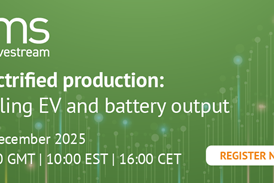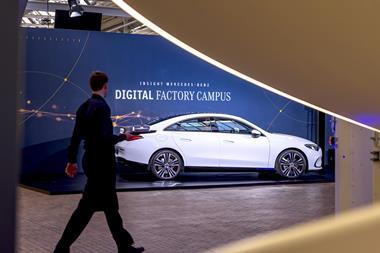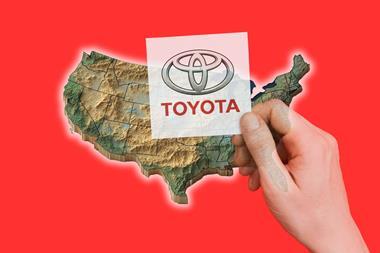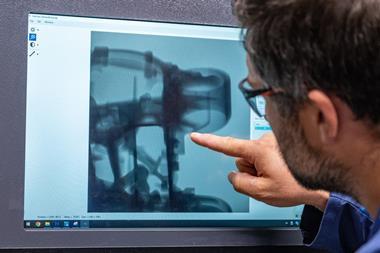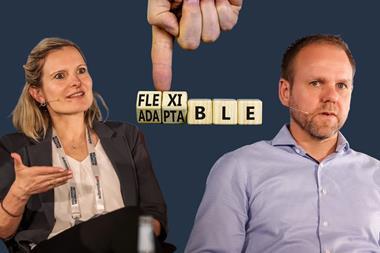Previously Volvo’s purchasing director in South America, Erodes Berbetz talks about his new role as head of procurement for Mercedes-Benz Brazil and Daimler Latin America, following his appointment in April this year
 Joanne Perry (JP): What lessons can you apply to your current role from your previous experience with Volvo, and what are the key differences between these two situations?
Joanne Perry (JP): What lessons can you apply to your current role from your previous experience with Volvo, and what are the key differences between these two situations?
Erodes Berbetz (EB): I think what I brought with me was not exactly from the previous company but actually from myself. So, it’s the way I deal with suppliers, the experience of building strong and long-term relationships, dealing with people, being very close to the team and being very hands on – I think these are the characteristics I’m bringing to Mercedes.
The key differences are that Volvo is focused on medium, heavy and extra-heavy trucks while Mercedes in Brazil has a broader range of products, from light-duty to extra-heavy trucks and also vans and passenger cars, which gives us a little bit more complexity in terms of the supplier base. And also because we produce in-house components at Mercedes – axles, engines, cabs and some other operations – which is not the case for Volvo, this also brings some differences, including the supplier base.
JP: And of course conducting some production in house makes the supply chain more secure because it avoids delivery problems with suppliers?
EB: Yes. There are some good advantages: the flexibility in production and having full control of the component. But of course it brings a bit more complexity because we need to buy the raw material – the steel, for example.
"The challenge for us in procurement is to improve, adapt or prepare our supplier base for future technologies and for more volumes"
– Erodes Berbetz, Mercedes-Benz Brazil
JP: What are your most important targets in your new role?
EB: I think we need to keep the product cost control. It is very important to keep competitive prices; to ensure that we keep the good level of local content we have today; and to develop the supplier base. These are three targets. Also, one objective is to ensure that our organisation and procurement are really adapted to the demands that we are going to have in the future.
JP: Daimler currently has two plants in Brazil [São Bernardo do Campo and Juiz de Fora] and one in Argentina [Buenos Aires]. What are the main differences in the procurement challenges at these operations?
EB: The demands or requirements from one or another plant are exactly the same: we push for high quality and competitiveness. Depending on the market situation one or another country can vary – sometimes it’s more favourable in Brazil, sometimes more favourable in Argentina, depending on the cycle of the business – but I think the challenges are quite similar.

EB: Not that much, because the commercial vehicle procurement is completely centralised in São Bernardo do Campo although we moved the production from here to Juiz de Fora. We ended some contracts with unique suppliers for passenger cars at that time and we needed to establish a new logistics flow for components, and also some suppliers had to start operations around our plant over there, but the procurement structure itself didn’t require so much reorganisation.
JP: You mentioned that you have a good level of local content; what is the current percentage and will this increase?
EB: At Mercedes the local content is important per vehicle actually, and what I can tell you is that Mercedes has been in Brazil for almost 60 years and our products are very mature, and the local supplier base is mature, so nowadays we have very comfortable levels in terms of local content for most of our products.
If the question then is will the level increase, we are always strategically thinking about having more local content. We always strive for and foster local content, providing that we have the right levels in terms of quality and competitiveness. So yes, primarily we can say that the local content will increase even further if we have competitive advantages with the prices in Brazil.
"Suppliers need to improve the capacity installed in their plants; we need to have more flexibility and quality but also to create more competitiveness"
– Erodes Berbetz, Mercedes-Benz Brazil
JP: What improvements would you like to see in the quality of the local supplier network?
EB: In the same way as Mercedes has been established here for years, the supplier base in Brazil is also well established, having matured over 60 years. Most of the important players are not Brazilian companies but European, American or Asian companies which have brought over the years a very good level in terms of quality and technology. Even the Brazilian ones are global players not only supplying to this market but also to others. Generally speaking, the quality level is good in the supplier base.
JP: You said earlier that you are actively working to improve the supply base; what does this actually involve?
EB: The supplier base is very important for Mercedes. What I want to see, strategically thinking about the future, is that the supplier base is ready for more technology, competitiveness and flexibility. These are the improvements we are foreseeing and these are the things we need to work on.
We have also one very important programme, Premio Interação, a prize that we give to suppliers at the end of the year. The award motivates and also recognises the good quality of our suppliers in several aspects, not only price and cost reduction but also quality, development, environment, support to engineering and logistics. So we work very closely with the supplier base. This is one of the things we want to foster even further: the collaboration with the supplier base.
JP: What effect does Brazil’s Inovar-Auto programme, which promotes local content, have on your procurement decisions?
EB: Inovar-Auto is actually a broader programme that gives incentives to local companies not only for supply or production but also for technology, innovation, and research and development. Mercedes is well established and we are at the right level; we have 100% compliance and experience in both local content and Inovar-Auto.

We also have a development centre in Brazil [São Bernardo do Campo] – an engineering department where we have around 600 engineers – which is working on new technologies, innovations and development and this is also part of the requirement.
Sometimes people from abroad think Inovar-Auto is a programme to create more barriers but I see it much more as an incentive for local development of the industry.
JP: In 2015 or early 2016, Mercedes-Benz is due to complete a new car plant with a capacity of 20,000upa at Iracemápolis, São Paulo. What procurement preparations are you making for this development?
EB: We are starting to have contact with the supplier base. The plant is under construction, so of course in this area – the indirect products and services – we are moving ahead faster. It’s natural also that we are in closer contact with the partners that are already supplying Europe or other locations for these products. It doesn’t mean that the sourcing is decided but it’s a trend; we are in parallel investigating some other suppliers that could support us. It’s an important supplier base change and we are at a delicate moment in terms of first discussions, so I can’t disclose more details.
JP: But there won’t be a supplier park?
EB: No. That’s one of the reasons we have actually established a plant in a region where we can have access logistically speaking. It’s not a remote place where we need to build a new park.
JP: Looking at Brazil as a whole, though, the logistics can be quite difficult and sometimes it must be better to have suppliers on site, especially for JIT delivery?
EB: It’s a very important relation in terms of cost versus the risk. But I think that this region particularly is well served in terms of the roads. We do have issues in the country in some regions, which come under future [government] programmes to improve the infrastructure, but this particular region within São Paulo is very well served in terms of roads and so the risks are much lower. The north-east, even the centre of the country may have problems, but São Paulo and Minas Gerais [the key automotive hubs] are very well established.

EB: South America is a growing market, it’s true. The volumes were growing at a very good rate last year and they will continue like that. Also we have new truck manufacturers arriving, particularly in Brazil – which is good. I think this is bringing more demands from the customers; they want to have better products and that’s what Mercedes is strategically thinking about the future, bringing about our new family of trucks.
What is important for the future is more technology for fuel efficiency and safety. The challenge for us in procurement is to improve, adapt or prepare our supplier base for those new technologies and for more volumes. Suppliers need to improve the capacity installed in their plants; we need to have more flexibility and quality but also to create more competitiveness. So we need to ensure the supplier base is ready in terms of production and flexibility but also competitive cost.
JP: So it comes back to good communication with the suppliers and building strong relationships?
EB: Exactly!









